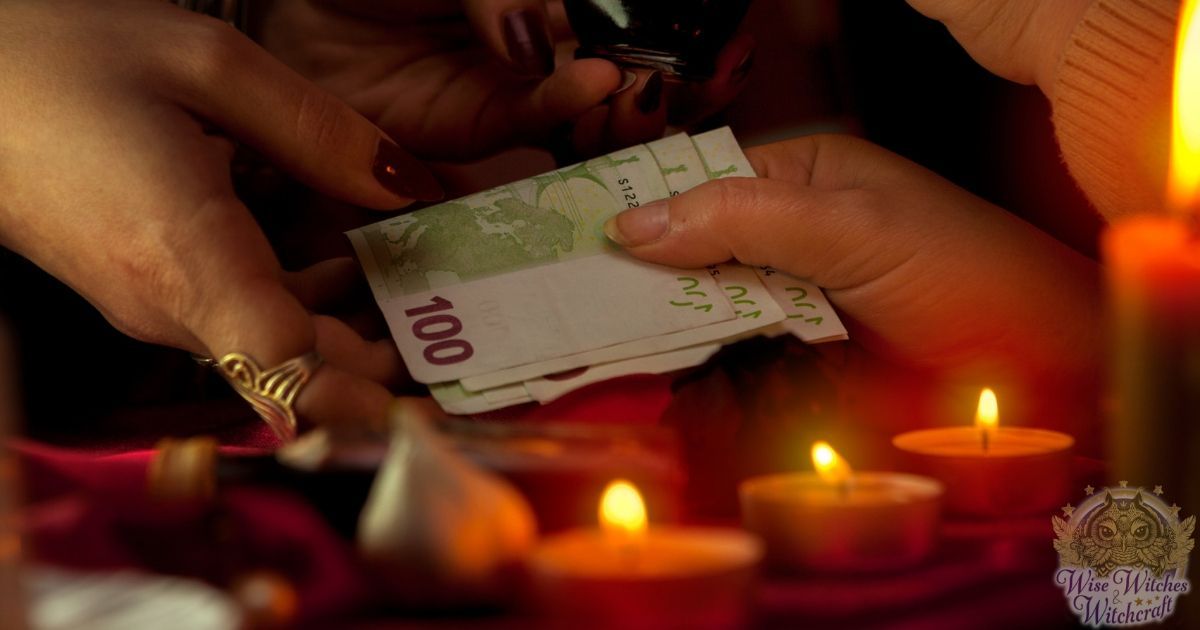Pagan & Wiccan Ethics: Charging Money for Magic

“Money often costs too much.”
– Ralph Waldo Emerson
No matter where you travel in the broad Neo-Pagan community you are very likely to stumble upon a discussion on charging money for spells, divination, psychic readings, auric work, etc. In those discussions, you will find two pretty firm camps – those that feel accepting money is fine, and those that do not. The only middle ground seems to be with things like creating an astrology chart or specialized magical tools. So where does the problem really lie?
Accepting Money for Magic: Perceptions

There seems to be this concept that anyone who charges for spiritual services is pretty much a snake oil salesman. This even holds true with those that accept barter and trade, depending on how hefty the terms were. It’s as if the minute that money enters the equation the “magic” is null and void. When we look at this predicament one wonders, why is money such a horrible thing?
Let’s take a simple example. A person writes books about spirituality and magic. That same person gets a small sum per book sold. Is that right or wrong ethically? Literally (no pun intended), the amount made is approximately $1 per book (if that) for hundreds of hours of research and writing. If anything, they’re being woefully underpaid. However, that same writer at a gathering will get dozens of people asking for a free book, some of which just plunked down $100 for a crystal cluster at the previous table. Somehow, it’s OK to charge for the crystal, but not a book. This example is a true story repeated by many respectable authors.
The same holds true for psychic readers. Now, there’s no question that some people truly do not have the money but also have a verifiable need. But there are also people in the magical community who are not truly looking for answers (other than the one they WANT) or who purposefully or inadvertently take advantage of good-hearted folk. So that’s where anyone struggles. It’s a difficult truth that humans generally appreciate things they’ve paid for more than something for free. What is the answer?
Realistically charging for goods or services, or offering barter or trade is perfectly ethical. Let’s consider why.
Charging for Magic: The Money Monster

We live in times where money is truly seen as the root of all evil. More realistically, however, money is the route to paying the bills. Some form of currency has been around for at least four millennia. Sometimes it was shells or stones, other time metal coins, but as humans started traveling and trading they needed something that represented the value of their product.
Consider the spice trade. Good ol’ Roy takes his spices and all their magical qualities on the road. As he travels, he shares stories of the Gods, Goddesses, and Heroes associated with any one of them. He meets Sally, the baker’s wife who would love some of the spices, but she has little to offer but bread. Well, Roy can certainly use traveler’s bread, so they make an exchange. Both walk away happy.
But what if that exchange wasn’t possible. Perhaps Sally had no baked goods that day but DID have coin. She could give Roy coins, and he could then apply them to something he wanted or needed, including food.
As you can see money is simply a form of exchange. In and of itself it is not bad or good. The key is in how it’s used. Some individuals would give up nearly anything for a certain amount of cash. And there are some people who would have you believe that spending $1,000 on a prosperity spell is money well used. Both ends of the spectrum have serious moral issues.
Bartering for Magic: Energy for Energy

If you go to your office and spend two hours there doing your job you expect to be paid right? You get money in return for your talents and efforts. Why shouldn’t magical goods and services be seen similarly? Your friendly neighborhood psychic reader, call her Amy, may be a stay-at-home mom because she can’t afford daycare. Doing readings provides for her family, but it still takes time out of her day. Should she not be compensated for her time and abilities?
Similarly, what happens when Joe, who had been working 60 hour weeks, begins crafting mojo pouches and selling them? His goal is just working normal hours while providing skills and services to the Neo-Pagan and Wiccan community. There is no reason he should feel compelled to do this for free.
In both cases at the end of the day, both Amy and Joe create a lot of positive energy.
- They offer a skill or services that the magical community needs
- They can give more of their energy to their skills or services because the money made relieves them of other heavy burdens
- They can take better care of their families and give them more time and attention.
That’s a pretty good “take away” for everyone involved.
As Above, So Below, As Within, So Without

Everything in magic is about balance. If we take from nature, we should give back. If we accept a loan, we should repay it. Everything is about exchange be it energy, time, goods or money. There are certainly “takers” among any group who feel they are somehow entitled to the freebie, no matter what that might truly cost the giver.
An example might be a person who has been offered a free Tarot reading but shows up late and still expects their full time. This is infuriating. What’s worse is that “takers” rarely appreciate what they’ve been given. They didn’t have to pay for it, so what’s the “value”?
So when a magical person requests even the smallest of fees they pretty quickly weed out “takers.” It doesn’t always work, but it’s a starting point.
Pagan Exchanges and Gratitude

Another big red flag in energetic exchanges is whether or not you see the person actually thankful for the effort, and then putting to use what they gleaned. True story: a guy comes to a reader and explains his situation. At first, the reader agrees to a discounted reading that fits his budget. When the reading begins, it becomes clear that he has been to many other readers before and really just wants someone to say what he WANTS to hear vs. what he NEEDS to hear. At that point the reader stops, explains and the guy wants a refund. Ok, we get it, (and the refund was given) but the guy started out with bad intentions, was told the truth and then blamed the reader. This happens ALL THE TIME.
The reality is if someone has goods or services at a price that you feel is over the top, just go elsewhere. It’s just like shopping at the mall. Price doesn’t always equal quality, and generally, you can find a proverbial store that fits your pocketbook and your ethical guidelines.

It is time to give pause to give some more insight into the person who has goods or services for sale. An honest energy worker in any field knows that there are moments when the Universe says NOW, without any thought of reciprocation. That’s called walking your talk. Charity is noble, and one of the human attributes to which we should all strive to achieve.
The next question becomes – should there be some other exchange? Could that person give you an hour watching the kids so you can catch up on other matters. Do they perhaps have a skill that you or someone you know desperately needs (plumbing, lawn work, pet care, taxes..)? Really, most people are happy to provide an honest exchange of time for your energy and abilities. But you have to open that door.
Your Feelings?
So how do you feel about paying for spiritual goods and service? Your answer to that may guide you toward or away from specific “vendors.” It’s always good to trust your instincts. If you really want a service or item from someone and it’s just beyond your finances, offer options. The worse anyone can say is no.
Legal Matters and Charging for Magic

At this point we would like to point out that divination and fortunetelling are sometimes regulated by law in various places. If a person is operating in a “no-fly” zone (so to speak) it’s really not ethical to support them. Just because we’re magical people doesn’t mean we can simply brush off the law.
Similarly, a person with goods or services making specific claims of success can be subject to truth in advertising laws. Honestly, anyone claiming their readings or spells are perfect 100% of the time is full of… um… (impolite word omitted). That $400 piece of jewelry purportedly inhabited by an ancient, powerful spirit – really? Not so much so. There is “woo-woo,” and there is WOO WOO. Don’t get suckered in by grandiose claims that do nothing more than drain your bank account.
Buying “Just Because”
We remember a moment when purchasing something and received a dozen questions why. Sometimes the reply was “I like it, and it’s pretty.” That’s not what anyone wanted to hear. It is still wholly ok to buy a magical tool just because it’s lovely even if you don’t plan on using it for anything more than an accent piece. This is kind of the flip side of money for magic. Someone made that piece with specific energies in mind and charged accordingly. You just bought it “because”!
Magical Tithing?
One of the inserts into the discussion about magic and money is the idea of a tithe. Churches pass a plate. Some Circles do likewise or have an offering jar. It doesn’t matter what one gives, what matters is your heart. Even that pocket change can help pay for rental space, ritual components or an after-ritual feast! You need not be compelled to help out financially, but you can certainly offer to help clean up afterward (for example).
Charging a Fee for Magic: Making Choices

Your choice as to whether you pay for specific goods or services is that – a choice. There is no perfect right or wrong answer other than that with which your spirit feels comfortable. Chime in on the discussion of ethics and how they affect magical practices!




